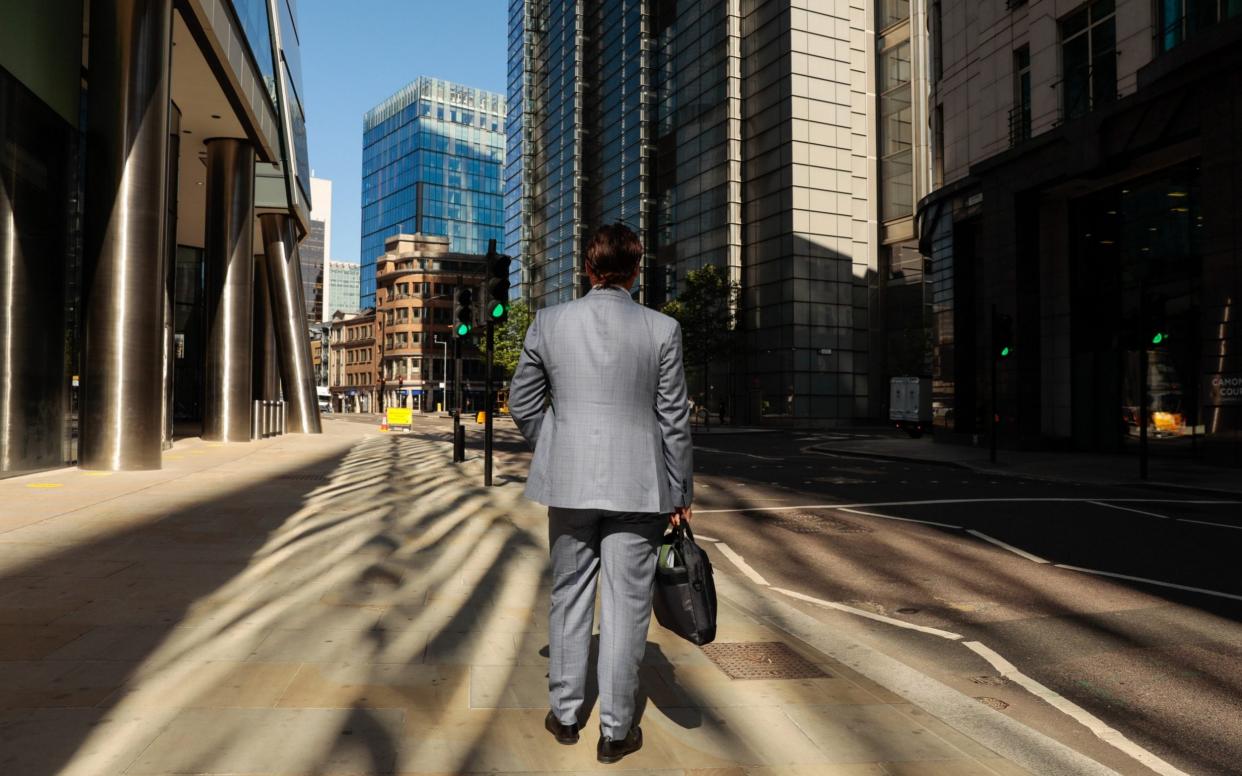Why the City of London has turned into a ghost town

Barclays’ boss Jes Staley declared in April that the era of packing 7,000 people into an office may be over.
The pandemic threatens to be a Defcon 1 event for the City's commercial real estate market.
Work-related travel is down 58pc in Greater London, according to data from Google. This is likely to be even more significant for office-based workers.
Longer term, analysts at Shore Capital are predicting that a quarter of time previously spent in the office will now be spent at home.
This shift may simply be an acceleration of a phenomenon already underway before Covid-19 ever reached the UK.
Demand for office space has been hit in recent years. First, heavy job losses in the 2008 financial crisis reduced the need for space.
More recently, growth has been tempered by the migration of some jobs to Frankfurt, Paris and Dublin due to Brexit and an unwillingness to hire in big numbers amid uncertainty over the City's future outside the EU.

Institutions have also been trying to cut costs. Banks alone have axed six million square feet of London office space - roughly equivalent to 100 football pitches - in the past nine years, according to property firm CBRE.
Credit Suisse is ditching nine floors of offices and Barclays is reported to be considering dumping its investment bank's Canary Wharf headquarters.
Companies were also encouraging "flexible working" even before the pandemic.
"We've been working on remote and flexible working for a number of years prior to this," says Andrew Horton, chief executive of Beazley, the FTSE 250 insurer.
Beazley is moving 700 people across the City to Bishopsgate at the start of next year.
"We were already taking less space in there than we had [before] because we were on this route to more remote working," says Horton.
"Our chief operating officer was concerned about taking less space, because he was worried about fitting everybody in because we've been growing. Now he's not worried."

The pandemic is telling some companies what they already knew: if teams in different countries can work cross-border then people in the same city need not be in the same building as each other.
Lawyers and consultants were already inching towards more flexible work patterns, with many working from home one or two days a week.
Companies upgrading technology have done away with desktop computers, giving employees laptops that connect directly to their firms' networks wherever they are.
Domestically-focused businesses such as wealth manager St James's Place (SJP) are also getting on board with the change.
Its partners around the country are making 5,000 Microsoft Teams calls a day, compared to just four on 15 March, says Andy Croft, its chief executive.
SJP's Lombard Street office in the City could operate at no more than 30pc capacity due to social distancing, says Croft. Only two people are allowed to use the lifts at a time.
"That lunchtime rush to the sandwich shop might take quite some time," he says.
"Even if everyone wanted to come back to work, we couldn't let everyone come back," says Croft, who says there is no single team whose presence in the office is critical.
Down the street, Lloyd's of London's modernisation strategy included a major push to do more business online instead of in its underwriting room where brokers queue up to meet insurers sitting at small desks to haggle over contracts.
The initiative was turbocharged overnight as the underwriting room was forced to shut. Even with the Government encouraging people to get back to offices, the underwriting room is not due to reopen until September.
Trading floors have been quicker to return to a semblance of normality. Barclays, for example, is bringing back 700 staff across the UK, US and India in July and August including some trading roles.
Trading floors are strictly regulated with personal mobiles often banned to ensure all calls are recorded to limit the risk of insider dealing. This is difficult and potentially invasive to replicate at home.
However, outside the big banks, many of the smaller buy-side outfits are continuing to work from home, calling into question whether even trading floors may become an unnecessary expense.
"As long as we have fit and proper controls when performing our roles there is no regulatory requirement to return to the office," says Matthew McLoughlin, head of trading at Liontrust Asset Management. His small team of traders continues to work from home.
Another trader says working from home has been a revelation for colleagues who usually wake up at 5.00am or 5.30am to get into work before the first corporate news of the day.
Two industry bosses agreed that finding a way to allow people to work from home will help to attract and retain talented staff, potentially heaping more pain on commercial property owners in central London.
Working in a City that has been hollowed out and where shops and cafés have gone bust may be even less attractive than it was before.

 Yahoo News
Yahoo News 
